Emergency Dentist – Columbus, NJ
Expert Smile Care Right When You Need It
When you or a family member have a hurting, broken, or knocked-out tooth, the last thing you want to do is waste valuable time sitting in a waiting room. That’s exactly what will happen if you visit the ER. If you ever need urgent dental care, your best bet is always to call Columbus Dental Arts. Dr. Fraser has the experience, training, and technology to be able to expertly handle all sorts of dental emergencies much more quickly and effectively than the ER can. We’ll even try to schedule an appointment for you on the same day that you call us, so you can get out of pain and back to smiling thanks to emergency dentistry in Columbus, NJ!

Why Choose Columbus Dental Arts for Emergency Dentistry?
- Same-Day Dental Appointments Available
- Patients of All Ages Welcome
- Dentist with 30+ Years’ Experience
How We Treat Dental Emergencies

- Same-Day Appointments: When a dental emergency occurs, call us; in many cases, we’ll be able to make time to see you on the same day. During your call, our team will ask about your symptoms and give you first-aid advice.
- Emergency Exam: Your emergency appointment will begin with a thorough examination of your teeth so that we can figure out what’s wrong. If you’re currently in pain, helping you find relief will be a top priority.
- Review Findings: We’ll share the results of our examination with you and explain what treatments can potentially restore the health of your smile. We’ll always give you an estimate of the cost and length of any treatments that we recommend before you need to make any decisions.
- Get the Care You Need: After a plan has been agreed upon, it will be time for us to carry out your treatment.
The Most Common Dental Emergencies
What counts as a dental emergency? It’s not always apparent that a dental issue is urgent enough to warrant an emergency visit, but we encourage you to call our office to hear what our team has to say about your situation. The chart below includes some particularly common examples of dental emergencies; reach out to us as soon as you notice any of these symptoms!
Understanding the Cost of Emergency Dentistry

Dental emergencies are by their very nature unexpected and stressful, especially when considering the cost of urgent care. However, at Columbus Dental Arts, we understand that our patients need an affordable way to find relief. So, if you’re concerned about the cost of your emergency treatment, read more below. We’ve broken down the factors that influence the price of emergency dentistry so you can make an informed decision about your smile.
Every Dental Emergency is Different
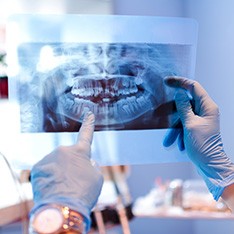
No two dental emergencies are exactly alike, which means the costs can vary widely based on several factors, such as:
- The Type of Emergency: A simple treatment for a minor toothache will cost less than a complex procedure like a root canal or tooth extraction.
- Required Procedures: Some emergencies may need multiple treatments or follow-up visits.
- The Severity of the Issue: More severe dental problems may require more extensive and expensive treatments.
- The Materials Used: The cost can also depend on the type of materials used for restorations, such as fillings or crowns.
Our team will assess your situation as soon as you come in and provide a personalized estimate based on your specific needs.
Taking Care of Your Smile Can Save You Money

Investing in preventive dental care is one of the most effective ways to avoid costly emergencies. By maintaining good oral hygiene at home and getting care when you first notice a problem, you can prevent it from turning into a serious issue. Here are some tips to help you save money in the long run:
- Maintain Daily Oral Hygiene: Brush and floss regularly to prevent cavities and gum disease.
- Regular Dental Checkups: Visit our office at least twice a year for cleanings and examinations.
- Protect Your Teeth: Wear a mouthguard during sports or a nightguard if you grind your teeth.
- Healthy Diet: Limit sugary and acidic food and drinks that can damage your tooth enamel. Or, at the very least, rinse often with water to avoid buildup.
By being proactive and caring for your teeth, you reduce the risk of emergencies and the associated costs!
Does Dental Insurance Cover Dental Emergencies?
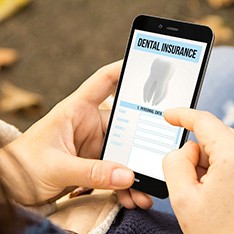
Most dental insurance plans provide some coverage for emergency treatments, especially if they are deemed medically necessary. However, coverage varies by provider and specific policy. So, it's important to review your insurance plan to understand what is included. If you need help with any aspect of your dental insurance, our team can help you parse your insurance benefits to maximize your coverage.
Other Options for Making Dental Emergencies Affordable

At Columbus Dental Arts, we understand that many patients either can’t afford dental insurance or don’t receive benefits through their workplace. So, to help more patients get the care they need, we offer flexible payment plans that can help you break down your costs into more manageable, budget-friendly pieces.
Our goal is to ensure you can get relief from your worst dental issues without unnecessary financial stress. If you have concerns about your financial situation, don’t hesitate to reach out to us and discuss it with our team. We’re more than happy to help you find a solution that’s right for you!
Keys to Preventing Dental Emergencies

Sadly, not all dental emergencies can be avoided. The good news is that you can significantly reduce your risk by committing to the following:
Visit Us Twice a Year for a Checkup and Cleaning
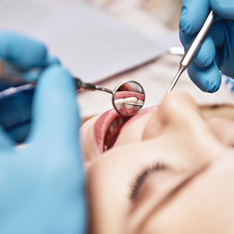
Your routine visits to our Columbus dental office ensure that we remove plaque and tartar before it has a chance to build up, but that’s not all. The exam ensures that tooth decay, periodontal disease, damaged restorations, and the like are caught and treated early on (before they require emergency care). So, if you haven’t been to our office in the last six months, it’s time to schedule your next visit!
Brush Your Teeth Each Morning and Evening

To keep your teeth healthy, you need to commit to good oral hygiene habits at home, like brushing twice a day. Make sure you do so for a full two minutes, and that you use a soft-bristled toothbrush and fluoridated toothpaste. It’s also important that you floss and rinse with mouthwash at least once a day, ideally right before bed. These habits might seem small, but they have a big impact on the health of your teeth and gums.
Wear a Mouthguard If You Play Sports
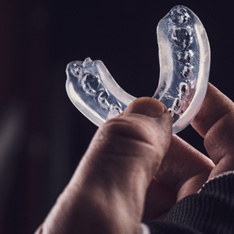
You wouldn’t play football without a helmet, right? For the same reason, you shouldn’t participate in any contact sports without a mouthguard. In fact, we recommend wearing one even if you participate in a solo sport, like rollerblading or skateboarding. That way, your teeth are protected if you accidentally fall.
Tip: Don’t waste your money on the mouthguards they sell at sporting goods stores. Instead, come to our office so we can have a custom one made for you.
Break Bad Habits, Like Smoking
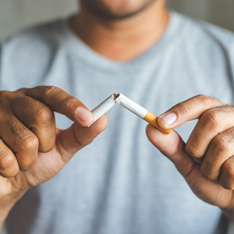
It’s no secret that smoking can stain your teeth and leave an unpleasant odor on your breath. But did you know it also increases your risk of common dental injuries? That’s one of the many reasons why we recommend quitting so strongly. If you’ve had trouble in the past, don’t hesitate to let us know. We can share recommendations and resources that have helped other patients over the years.
Keep Added Sugar to a Minimum

The reason we recommend keeping foods and drinks with added sugar to a minimum is because they wreak havoc on your oral health. So, if you want to avoid a painful dental injury that warrants a same-day visit to our office for treatment, then it’s important to be mindful of your diet. Instead of over-indulging on sugar, focus on filling your plate with smile-friendly foods, like plain yogurt, oatmeal, carrots, and egg whites.
Don’t Use Your Teeth as Tools

When the scissors aren’t around or your hands are full, you might be tempted to use your teeth to tear open plastic wrapping or hold your keys. This might seem harmless, but it can quickly lead to dental damage, like a crack in your enamel, which is why we don’t recommend using your teeth as tools.
Root Canals
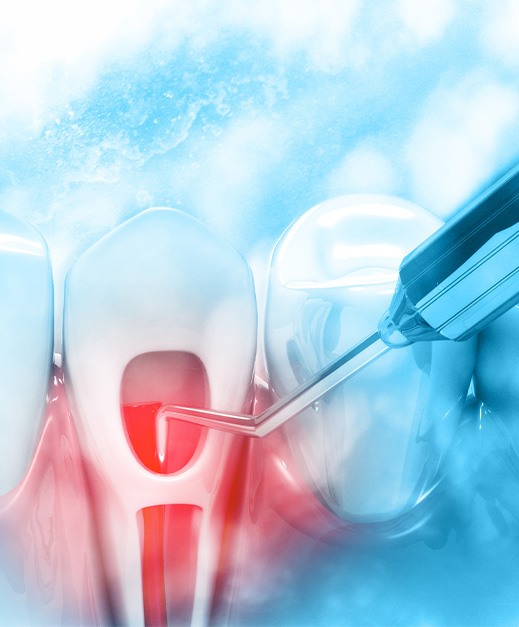
Often, intense pain in one particular tooth indicates an infection that, if left untreated, could cause the tooth to die. The infection could also spread to surrounding teeth and even other parts of your body. To preserve your natural tooth as well as your overall health, we can use root canal therapy to remove the diseased tissue inside of the tooth. Despite the rumors you may have heard, root canals are nothing to fear; with today’s anesthetic techniques, they’re no more uncomfortable than getting a cavity filled.
Learn More About Root Canal Therapy
Tooth Extractions
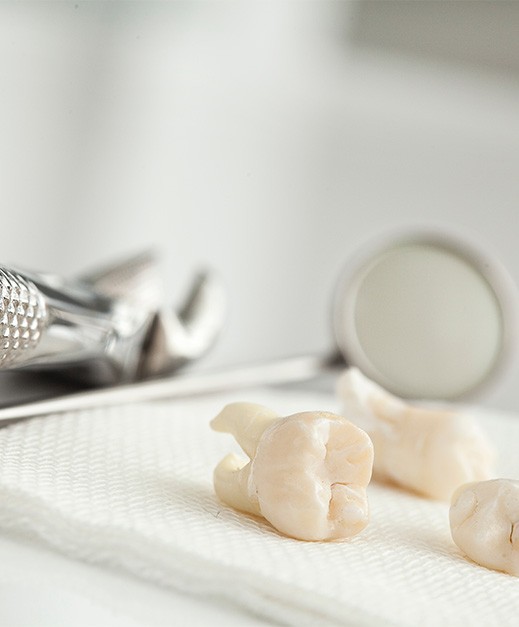
At Columbus Dental Arts, we do everything we can to save your natural teeth whenever possible. However, sometimes the damage to a tooth is so great that it cannot be salvaged and removing it would be the wisest option for your oral health. In these situations, Dr. Fraser will make sure your procedure is as painless as possible. After you’ve healed, we can discuss options for replacing your tooth and giving you a complete smile.
Learn More About Tooth Extractions
Emergency Dentistry FAQs
Dental emergencies often come unexpectedly, so it is completely understandable for you to have some unanswered questions. It can be difficult to know what to expect when you are experiencing lots of discomfort and uncertainty, so we’re here to help! Here are the answers to some of the most common questions we receive about dental emergencies in Columbus. If you don’t see the information that you’re looking for below, don’t worry! Give us a call and we’d be happy to help you navigate your situation.
Will my toothache go away on its own?
Toothaches don’t typically go away on their own. Because of this, it is best to schedule a checkup with a dentist to make sure nothing serious is going on. There are all sorts of potential causes for toothache, so you’ll want to rule them out with a professional as soon as possible. Doing this can help you to catch underlying problems before they become more serious.
How should I sleep with tooth pain?
It can be difficult to get quality sleep when you’re dealing with a toothache. Until you’re able to see a dentist in the morning, keep your head elevated. This will prevent blood from rushing to your head and intensifying your toothache. Additionally, take over-the-counter pain relievers as directed and avoid foods that are acidic, cold, or hard before bed. A cold compress may also be able to help numb some of the discomfort.
Should I visit the emergency room first for dental emergencies?
Most emergency rooms aren’t able to address dental emergencies effectively, but there are a few main exceptions to this. You should head directly to the ER if you have experienced a jaw fracture or dislocation, a serious cut or laceration to the face or mouth, or an abscess or infection that is swollen to the point of affecting your breathing or swallowing. In pretty much any other circumstance, you should visit the dental office first.
Should knocked-out teeth be placed in water?
Water can be used to rinse a tooth that has been knocked out, but the tooth should not be placed in water. This is because water can damage the root surface cells of teeth, reducing the chances of it being able to be placed back in the socket. Instead, you should do your best to place it back in the open socket yourself before heading to the dental office. If you are unable to do so, you can place it in milk, saliva, or saline solution while you seek treatment.
